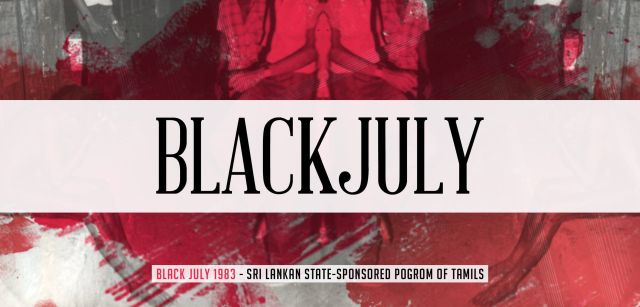
This month, Tamils around the world are commemorating the 30th anniversary of a massacre in which an estimated 3000 people were killed.
In a week beginning July 24, 1983, Tamils across the island of Sri Lanka were attacked by Sinhalese mobs, while the army and police looked on, or even joined in the attacks. In some cases the mobs were led by government ministers.
The July 1983 massacre was the culmination of a series of anti-Tamil riots, beginning in 1956.
These riots were one manifestation of the anti-Tamil racism promoted by successive Sri Lankan governments. These governments carried out policies of discrimination against Tamils. In 1948 they deprived Tamil plantation workers of the right to vote.
In 1956, they made Sinhalese the sole official language of Sri Lanka, instead of giving the Sinhalese and Tamil languages equal status. There was discrimination in education and employment.
Peaceful protests against discrimination were met with violent repression. These policies led to the growth of support for an independent Tamil homeland in the north and east of the island of Sri Lanka.
Some Tamil youth took up arms to achieve this goal. After the July 1983 massacre, support for the armed struggle grew massively.
The Liberation Tigers of Tamil Eelam (LTTE) were eventually able to drive the Sri Lankan army out of some parts of the Tamil homeland, and establish their own government in liberated areas.
The war of independence continued, with some interruptions during periods of ceasefire, until 2009.
Eventually the Sri Lankan government won the war, with the help of military aid from the United States, Israel, India, China and other countries.
The war culminated in a genocidal massacre, as the Sri Lankan army, navy and air force bombarded displaced Tamil civilians, killing an estimated 40,000 people during the final weeks of the war.
Today Tamils live under military occupation. New military bases have been built in Tamil areas, despite the end of the war. Land has been confiscated from Tamils, and used for army bases, Sinhalese settlements and tourist hotels.
Tamils live in fear of arrest, torture, rape and murder by the Sri Lankan army and its associated paramilitary groups.
The Australian government colluded with the Sri Lankan government during the war, and continues to do so.
One example of such collusion was the arrest by the Australian Federal Police of three Tamil men — Australian citizens of Sri Lankan origin — in 2007. They were charged with terrorism offences.
The three men, like many other Tamils in Australia and around the world, had been involved in raising money for humanitarian purposes, including relief work after the December 2004 tsunami.
The aid was distributed in areas controlled by the LTTE. At the time of the tsunami a ceasefire was in effect, and the LTTE was recognised as the de facto government of big parts of the island.
The purpose of the prosecution was to intimidate Australian Tamils from helping Tamils living in the LTTE-controlled areas of Sri Lanka. Eventually the main charges against the three men were dropped, but by then the damage had been done.
Another way in which Australia played a role in the war against the Tamils was through the US military bases in Australia. These bases play a key role in communicating with US satellites. Surveillance information from these satellites was supplied to the Sri Lankan government.
Today the Australian government is sending back many asylum seekers who have fled from Sri Lanka, while others are locked up in detention centres.
This includes about 50 Tamils who have been accepted as refugees, but are deemed a “security threat” by ASIO — presumably because they are thought to have played some role in the Tamil independence struggle.
Supporting the struggle for an independent Tamil homeland is not a crime, nor is it a threat to the people of Australia.
The Socialist Alliance will continue to support the Tamil struggle for human rights and national self-determination, as well as the struggle for the rights of refugees and asylum seekers.
[Margarita Windisch is the Socialist Alliance candidate for the seat of Wills in the federal election.]